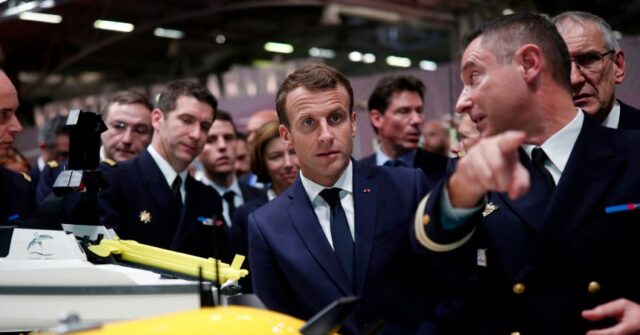Emmanuel Macron’s French government has made a notable move by banning Israeli defense contractors from participating in the upcoming Euronaval arms fair scheduled for November in Paris. This prohibition marks the second instance within the year where Israeli companies have faced exclusion from a French trade show, a decision that underscores the escalating tensions surrounding France’s stance on Israel’s military activities. Initially, seven Israeli firms, known for manufacturing military equipment and shipbuilding, were set to exhibit at Euronaval, which is a global platform for naval defense innovations attracting significant industry players and potential clients. Despite the ban on exhibition stands, the fair’s organizers confirmed that Israeli delegations are still welcome to attend, albeit without the opportunity to showcase their products—essentially negating the purpose of their participation.
This action at Euronaval aligns with a broader pattern of exclusion faced by Israeli companies in France, particularly demonstrated during the Eurosatory arms fair in May, where Israeli exhibitors were similarly barred. The decision to block participation at Eurosatory was predominantly fueled by President Macron’s disapproval of Israel’s military operations in Rafah, raising questions around the interplay of foreign policy and trade relations within the defense sector. While a French court later overruled the ban, the timing rendered the intervention moot as it came too late for the exhibitors to capitalize on the opportunity. Observations from the event indicated that attendees had to sign declarations disassociating from Israeli arms firms, which garnered significant criticism from the Conseil Représentatif des Institutions juives de France (Crif), highlighting a sense of discrimination and stigmatization against Israeli participants.
Crif President Yonathan Arfi publicly condemned the practice of requiring a declaration for Israeli attendees, labeling it as “obscene discrimination” that tarnishes France’s reputation as a nation of liberty and inclusiveness. The current clampdown on Israeli companies illustrates a striking shift in France’s defense policy and international relations under Macron’s leadership, suggesting a deeper alignment with certain geopolitical stances related to the Middle East conflicts. In the context of ongoing military actions in Gaza, Macron’s government has taken an assertive approach against Israeli military industries, emphasizing humanitarian concerns while inviting critiques of discrimination from various quarters, including Jewish organizations in France.
President Macron’s campaign appears to be evolving into an arms embargo against Israel, as indicated by his recent calls for halting military supplies to the country. The French government’s position is rooted in moral objections to the ongoing conflict, particularly in its ramifications for civilian populations in Gaza. In this vein, Macron articulated an intent to foster a diplomatic tone that promotes stability and human rights within the region. However, the backlash from Israeli leaders, including Prime Minister Benjamin Netanyahu, has been pronounced. Netanyahu has expressed outrage and branded the French initiative as shameful, particularly contrasting the perceived hypocrisy of calling for an embargo on Israel while allies in the region remain fully armed.
Netanyahu’s indignation further highlights the complexity of France’s decision, which deals not only with bilateral relations between France and Israel but also engages with broader international dynamics involving Iran and its military alliances with groups such as Hezbollah and Hamas. The Israeli Prime Minister’s remarks reflect an assertion that calls for an arms embargo on Israel while allowing adversarial forces to maintain armaments only serve to exacerbate tensions in the region. This pronounced dichotomy showcases the difficulties in navigating geopolitical relations rooted in longstanding historical conflicts and the challenges faced by Western nations in balancing responses.
As discussions surrounding the arms embargo unfold, the effects rippling through the defense industry and broader diplomatic relations are significant. The decisions taken by Macron’s administration provide a window into the shifting tide of European foreign policy concerning Israeli military action. They also call into question the role of arms fairs, traditionally seen as platforms for defense collaboration and innovation, which may become increasingly contentious spaces as states take definitive stances aligned with their geopolitical perspectives. The forthcoming weeks will reveal further implications for France, Israel, and their respective allies in understanding the balance between moral obligations and international defense trade amidst a backdrop of conflict.

